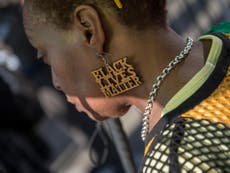Why are companies that don’t support their Black employees suddenly so vocal during Black History Month?
There are numerous indicators of whether your organisation’s approach matches its care for staff. But this is a good place to start


Your support helps us to tell the story
From reproductive rights to climate change to Big Tech, The Independent is on the ground when the story is developing. Whether it's investigating the financials of Elon Musk's pro-Trump PAC or producing our latest documentary, 'The A Word', which shines a light on the American women fighting for reproductive rights, we know how important it is to parse out the facts from the messaging.
At such a critical moment in US history, we need reporters on the ground. Your donation allows us to keep sending journalists to speak to both sides of the story.
The Independent is trusted by Americans across the entire political spectrum. And unlike many other quality news outlets, we choose not to lock Americans out of our reporting and analysis with paywalls. We believe quality journalism should be available to everyone, paid for by those who can afford it.
Your support makes all the difference.So, your company was silent at the height of the Black Lives Matter movement and now wants you to be the face of Black History Month (BHM). Perhaps they want you to smile for the company newsletter photo, or otherwise lead BHM talks – all so they can tick off the one and only thing that they (in reality, you) do for the company’s few junior black staff each year.
It may sound ridiculous, but this is the sad state of affairs in many organisations. BHM has been relegated to a redundant box to be ticked by HR teams to show that they are relevant and inclusive.
Am I a fan of corporate celebrations of Black History Month? Should Black History Month be celebrated in the workplace? Should black staff encourage their employers to hold Black History Month events?
My answer (unhelpfully) is both yes and no. Yes, absolutely in the sense that it is important but ONLY if it is done in the right way.
Essentially, BHM celebrations need to come from a place of genuine care and consideration of black experiences in the workplace. If companies and their leaders do not truly care about their black staff, then I don’t believe they should be doing or saying anything to commemorate Black History Month.
As CEO of the Equal Group, which was set up to “ give organisations the tools and support they need to fully reap the advantages that come from embracing equality diversity and inclusion”, I know that a company's approach to BHM gives a good indication of how much they care about their black staff. There are many signs that companies care, below are a few important signals:
- Budget – Without an adequate budget, it is unlikely that anything significant will be achieved. If you're in a large organisation and more money is allocated to directors’ lunch and travel expenses than the celebration of BHM, something is deeply wrong. The excuse of there's "no budget" is a great synonym for "we don't care enough about our black colleagues to do anything significant". The willingness to encourage black staff (who may already be working twice as hard due to structural racism) to work additional hours to organise and host BHM events without support or a budget reeks of exploitation and gives a good indication that your organisation may not truly care about the welfare of black employees.
- Unapologetically Black – Many will be aware that October is the UK’s dedicated month to recognise black history, some will also be aware that October coincides with National Inclusion Week, as well as playing host to Islamophobia Awareness Month, Breast Cancer Awareness Month, ADHD Awareness Month and Menopause Awareness Month, with a number of other awareness weeks and days littered across the month. While I recognise that this is to be expected, the plethora of additional activities and the increase of “Bame” terminology plays into a tendency for some to gloss over the need for a focus on black history and black issues. Matt Hancock’s inability to distinguish between Bame and black underlines the need for BHM to be unapologetically about all things black – any attempts to Bame-ify BHM are a key indication that organisations do not understand their black staff.
- Well planned – Effective companies will have had BHM on their radar and as part and parcel of their equality, diversity and inclusion plans for a long time – as opposed to organisations that started planning their BHM activities in September or in the wake of the recent social unrest. It's also likely that there will be a number of activities planned throughout the month, with meaningful work being done throughout the year to improve outcomes for black colleagues. BHM will be an opportunity for proactive companies to reflect on the work being done as well as acknowledging further areas of progress. A well-formed plan will also ensure that black colleagues have the bandwidth to be able to engage and contribute, rather than balancing these activities with their day jobs.
- Significant –For many organisations, BHM will be a rare opportunity to have a specific conversation about issues unique to black communities. A conversation that is specific to their team, their company and their sector. It’s a missed opportunity if the conversation is diverted exclusively towards talks about, say, Martin Luther King Jr and his non-violent approach to civil rights. As great as MLK was, BHM needs to be more action-oriented. Conversations about BHM need to be a catalyst for meaningful change, rather than a nostalgic trip down memory lane.
- Senior supported – Leadership involvement is a crucial measure of how seriously your organisation takes BHM. BHM is an opportunity for leaders to reconfirm their commitment to their black colleagues, especially in light of recent global events. Leaders who fail to actively engage with their organisation’s BHM activities will surely run the risk of alienating their black colleagues and sending the message to all staff that the welfare and engagement of their black colleagues is not a priority.
Mac Alonge is CEO at The Equal Group





Join our commenting forum
Join thought-provoking conversations, follow other Independent readers and see their replies
Comments